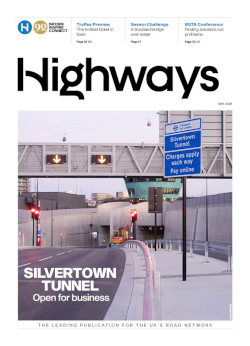At the closing symposium of the Freight Traffic Control 2050 project, the transport industry was warned that climate concerns will inevitably change logistics.
The symposium, which took place at the University of Liverpool’s Central London building, was supported by ITS (UK) and moderated by the Society’s Freight Forum Chair, Geoff Clarke of AECOM.
It heard how a variety of technology solutions are already making a difference in reducing the number of vehicles and kilometres used in deliveries and the resulting emissions. One highlighted innovation is a shared solution in the Scottish Highlands and Islands where one delivery company carries out deliveries for a range of different courier companies, with one driver able to integrate with each company’s parcel tracking software packages in real time, leading to a huge reduction in the number of vehicles needed and thus major cost savings.
The Symposium also heard how this same software is now being used effectively in very different conditions in London.
The issue of free delivery cropped up regularly during the day, with the logistics firms suggesting that this can have a significant effect on the demand for short-notice parcel delivery and therefore a high number of vehicles to carry them out.
Similarly the industry noted the potential effect of clean air zones on the viability of their current operations.
The need for better location information and route planning was identified, suggesting technology solutions are vital, while, after one plea for a kerbside booking system to reduce driving around waiting for availability, the symposium heard how an ITS (UK) member, Grid Smarter Cities, has already developed such a solution.
Autonomous vehicles were seen as part of the solution but not a silver bullet. As one speaker said, you will still need a human to find the exact address and carry goods to the door, although there was a place for driverless vehicles in getting the goods into the centre of a city.
Geoff Clarke of AECOM said, ‘It is clear that we will not be able to deliver the huge changes the freight industry needs to undertake without the use of technology.’
‘In the past it has been difficult for logistics suppliers to co-operate without risking their market share but we saw today examples of how organisations can use technology to do so without losing their competitive advantage. And given the environmental issues we face, this successful symposium has helped us see that such solutions are vital for transport to hit the tough targets it faces over the next 30 years,’ added Clarke.
‘Once again we see that technology will play a major role in improving our transport,’ added Jennie Martin, ITS (UK)’s Secretary General.





